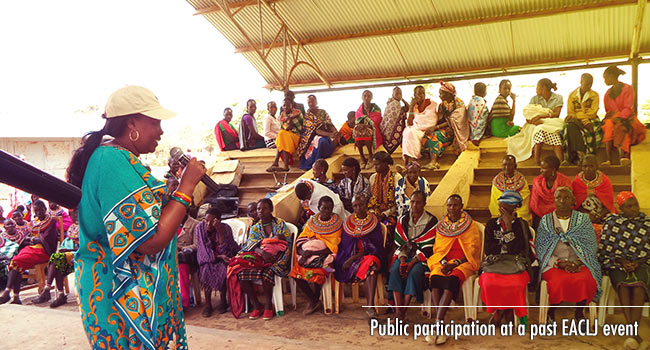Public Participation After The Elections

The Principle of Public Participation in Kenya is founded on the first Article of the new Constitution which provides that “All Sovereign power belongs to the people and shall be exercised only in accordance with this constitution.”
Consequently, Public participation is listed in the National Values and Principles of governance provided for under Articles 10 (2), 196, 174, 184,201 and 232 of the Constitution of Kenya 2010.
The principle is further upheld under the bill of rights at Article 35 which provides for the Right of access to Information. The right was recently established by passing the Access to Information Act of 2016 which guarantees every citizen’s right to ask, inquire and receive information from any government agencies as long as the information sought does not threaten national security or interfere with another person’s fundamental rights and freedoms.
In practice public participation is achieved through the enforcement of political rights under Article 38 more specifically the right to vote. Elections give the people the opportunity to decide who will be their leaders for a span of time and also appoint their representatives in specific government institutions. In Kenya, we decide who is to exercise authority over the state and the counties while appointing representatives to the legislative houses i.e National Assembly, Senate and County Assemblies.
The first action of elected leaders is to fill the other positions in the government which the constitution should be in an open, transparent and non-discriminative process. The positions are to be offered to the Kenyan Public and include; Cabinet Secretaries, County Executive Committee members, Diplomats, State Appointed institutions and Ward Administrators. Every Kenyan’s first point of contact is to put themselves up for consideration for these positions.
All these appointments have to go through the legislative assemblies which is National Assembly for State positions and County Assembly for County Public service. Article 118 of the constitution mandates parliament to conduct its business in an open manner and facilitate public involvement in their business which is enforced by the County Government Act in the County Assembly. Add to this, Article 119 accords every person the right to petition parliament to consider anything within its authority. This is further elaborated by the Petition to Parliament Procedure Act 2012. The second opportunity for all Kenyans is to Petition the legislative house on any matter within the houses mandate, attend the committees’ public hearing for any bill before the floor, make memoranda or give views on any matter before the house and bring an action against a state officer for violation of the constitution.
Once appointed all leaders get to manage public funds and resources which a citizen provide oversight through the legislative houses. But the Legislatures are also named to some avenues of public funds that is the National Government Constituency Development Fund (NG-CDF) for National Assembly and the Ward Development Fund (WDF) for County Assembly.
-
NG-CDF to begin with, is a fund consisting of monies of an amount of not less than 2.5% of all the national government's share of revenue meant to complement community based works and services falling within the functions of the National Government. This includes sport activities but in exclusion of cash awards. The fund is administered by the NG-CDF Board and distributed equally among the 290 constituencies and each constituency has a committee comprising of seven members, a government official and an ex-officio member from the NG-CDF board. The first opportunity with regards to the NG-CDF kitty for Kenyans is to put themselves up for consideration for this position. The list is taken to the National Assembly for approval and one can still challenge the legislators to reject a specific individual on substantial grounds. After appointment you can also petition the NG-CDF Board for the dissolution of your area committee setting out facts for their liability.
The chairperson of the Constituency Committee is required by law to convene public meetings in every ward in the constituency to deliberate on development matters within the first year of the commencement of the new parliament and at least once every two years thereafter. The committee shall collect and deliberate on project proposals from all wards and submit a list to the Board for funding within three months of the official release of the allocation table or such other time as the board may determine. Projects initiated by a community shall also eligible for support by the fund and shall be submitted with the list. Citizens’ second avenue is therefore to attend the forums, contribute to the deliberations and if they have ongoing community projects apply for support. The failure to convene the forums can be construed as a ground to petition for the dissolution of the committee and the citizens are the whistleblowers. Lastly, it is the citizens’ duty to monitor the projects funded and report any wrong doings to the board.
Lastly, the MNA creates a Constituency Oversight Committee comprising of him/her and four other members who shall at least twice every financial year convene public forums to mobilize, sensitize and take opinions/recommendations from the people. The Citizens role is to provide membership to the committee and/or attend the meetings.
-
WDF on the other hand, is a fund consisting of monies of an amount of not less than 5% of ordinary revenue of the County Government's (in our case Nairobi City) meant to complement community based works and services falling within the functions of the County Government. The fund is administered by the County WDF Management Committee and allocated for each ward through the WDF committee. The elected MCA shall convene open public meetings for his registered voters where each sub-ward shall elect five persons and the names shall be forwarded to the Fund officer to make the committee of seven persons with the MCA as an ex-officio member. The first point of contact with the WDF is to attend the public meeting, offer one self for consideration and elect the five representatives.
The chairperson of the WDF Committee is required by law to convene public meetings in the ward to deliberate on development matters within the first year of the commencement of the new Assembly and at least once every two years thereafter. The committee shall collect and deliberate on project proposals from all wards and submit a list to the WDF Management Committee for funding before the end of the month of. Projects initiated by a community shall also eligible for support by the fund and shall be submitted with the list. Citizens’ second avenue is to attend the forums, contribute to the deliberations and if they have ongoing community projects apply for support. It is the citizens’ duty to monitor the projects funded and report any wrong doings to the management committee.
In conclusion for the residents of Nairobi, we are privileged to have the Nairobi City County Public Participation (NCCPP) Act 2015. This is a county law aimed at giving effect to the provisions of Chapter Eleven of the Constitution by providing for a framework for informed, effective, efficient and sustainable engagement of the public in the affairs of the county. It provides for the County Executive Committee Member responsible for matters of Public Service in the County to be in charge of public participation in the County Executive while the Speaker of the County Assembly is to promote and facilitate public participation in the proceedings and other activities of the Assemble with the help of the offices of Sub-County, Ward and Village Administrators when need be.
Under the NCCPP Act, the County Government is to develop a culture of democratic governance that complements a system of participatory governance by establishing a civic education programme, publishing all its notices in two national newspapers and putting the notice in places where people converge like mosques and churches, establishing complaints processing mechanisms and communicating to the public at all times.
On the request of the County Executive Committee or a County Government organ, the County Government may facilitate resources for the convening of a citizens' participation forum and shall convene a citizens' participation forum once in three months to discuss any matter of public importance affecting the public or any community in the County or the delivery of services by the County Government. This can also be done at the Sub-county level on the request of a sub-County or town administrator, city or municipal manager or Member of the County Assembly AND/OR at the ward level on the request of a ward or village administrator or the member of the County Assembly. Members of a citizen forum in a ward or village may petition the ward or village administrator for a forum to discuss any of the issues of interest if supported by at least 100 persons; who shall be convened by the ward or village administrator.
The Act also empowers the citizens to petition to the County Executive Committee with the option of appealing the decision therein.
The buck does not stop at voting!





